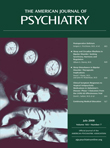Computer-Assisted Delivery of Cognitive-Behavioral Therapy for Addiction: A Randomized Trial of CBT4CBT
Abstract
Objectives: This study evaluated the efficacy of a computer-based version of cognitive-behavioral therapy (CBT) for substance dependence. Method: This was a randomized clinical trial in which 77 individuals seeking treatment for substance dependence at an outpatient community setting were randomly assigned to standard treatment or standard treatment with biweekly access to computer-based training in CBT (CBT4CBT) skills. Results: Treatment retention and data availability were comparable across the treatment conditions. Participants assigned to the CBT4CBT condition submitted significantly more urine specimens that were negative for any type of drugs and tended to have longer continuous periods of abstinence during treatment. The CBT4CBT program was positively evaluated by participants. In the CBT4CBT condition, outcome was more strongly associated with treatment engagement than in treatment as usual; furthermore, completion of homework assignments in CBT4CBT was significantly correlated with outcome and a significant predictor of treatment involvement. Conclusions: These data suggest that CBT4CBT is an effective adjunct to standard outpatient treatment for substance dependence and may provide an important means of making CBT, an empirically validated treatment, more broadly available.



